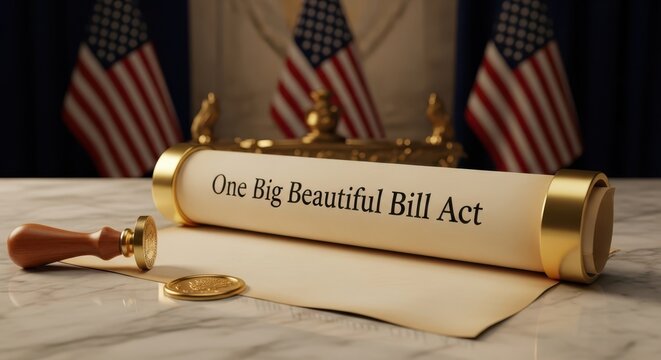
On July 4, 2025, the One Big Beautiful Bill Act (OBBBA) was signed into law with significant changes to federal tax law. There are many provisions that impact individuals, estates, and businesses. Some highlights include:
The 2017 Tax Cuts and Jobs Act (TCJA) tax cuts were made permanent. Tax rates and brackets were set to “sunset” to higher levels at the end of the year.

Seniors get an additional tax deduction. For the 2025 to 2028 tax years, individuals 65 and older can claim an additional deduction of $6,000 ($12,000 for qualifying married couples). This is in addition to the current additional standard deduction for seniors ($2,000 for single filers and $3,200 for married couples). There is a phase-out range for single filers with Modified Adjusted Gross Income (MAGI) between $75,000–$175,000 ($150,000–$250,000 for married couples) in which the deduction is reduced by $0.06 for every $1 over the threshold amount. OBBA also permanently raised the standard deduction to $15,750 for individuals ($31,500 for married couples) and will be adjusted for inflation going forward. In theory, a senior couple with under $75,000 of MAGI could deduct up to $46,700.
State and local tax (SALT) deduction limits have been raised. Under the TCJA, SALT deductions were capped at $10,000. However, the OBBA raises that limit to $40,000 with a few caveats. The full deduction phases out for filers with MAGI over $500,000 and is limited to $10,000 for those with income over $600,000.
Charitable donations are more complicated. Starting in 2026, individuals can claim a charitable deduction for cash gifts of up to $1,000 ($2,000 for married couples) even if they do not itemize their deductions. For those who do itemize, charitable donations must be 0.5% of their adjusted gross income. Only gifts above that amount will qualify for a deduction. Additionally, deductions are capped at 35%, even for individuals in the 37% marginal tax bracket. For those making larger donations, it may be advantageous to accelerate gifts to a donor-advised fund in 2025. It’s a similar story for corporations, too. Charitable contributions will only be deductible to the extent that they exceed 1% of taxable income, limited to 10%. Contributions below 1% are nondeductible.
Car loan interest is now deductible. For tax years 2025–2028, individuals can deduct interest paid for new personal use vehicles. Eligible taxpayers can deduct $10,000 per year in interest paid on qualifying loans. It is available regardless of whether you itemize or take a standard deduction. There is a phase-out for individuals with MAGI over $100,000 ($200,000 for married couples).
The estate and gift tax exemption has been raised and made permanent. The exemption will be raised to $15 million in 2026 ($30 million for couples with portability) and will increase annually with inflation. Green energy tax credits will be phased out. OBBBA significantly changes the subsidies that were in place under the Inflation Reduction Act. The “previously owned electric vehicle”, “new electric vehicle”, and “commercial electric vehicle” credits are repealed as of September 30, 2025. The “energy efficient home improvement” and “residential clean energy” credits are to be revoked after December 31, 2025. The “refueling property” and “new energy efficient home” credits are to be repealed after June 30, 2026
The OBBBA has a big impact on Health Savings Accounts (HSA), including a significant increase in the number of people who can contribute. Starting in 2026, all Bronze & Catastrophic plans qualify as high-deductible health plans, meaning that those in low-premium plans can open HSAs and save for tax-free medical expenses. Having a direct primary care arrangement no longer makes you ineligible for an HSA. A spouse’s Flexible Savings Account no longer makes you ineligible to participate in an HSA. The bill also added new categories of what’s considered a qualifying medical expense, including gym memberships. For those who qualify, you can contribute $4,300 to your HSA ($8,550 for a family) annually.
As with any change in law, the OBBBA introduces new opportunities and potential challenges. Understanding how it applies to your situation is essential for fine-tuning your financial plan. As usual, beauty is in the eye of the beholder, and whether OBBBA is beneficial or detrimental depends on your situation.
To learn more about how these changes might impact you or to speak with one of our registered investment advisors, call # (585) 381-4180 or contact us through our website.
Disclaimer:
Armbruster Capital Management’s views as portrayed in this post are subject to change based on market conditions and other factors. These views should not be construed as a recommendation for any specific security or sector. Investing involves risks, and the value of your investment will fluctuate over time, and you may gain or lose money. Past performance is no guarantee of future results.